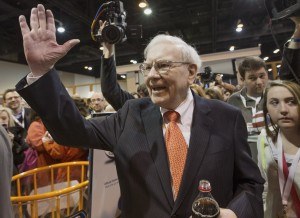
AP Photo/Nati Harnik
Warren Buffett, the second-richest man in the U.S., said his eventual successor as chief executive officer of Berkshire Hathaway Inc. should be the company’s sole manager getting stock options as compensation.
The next CEO should be “the only one who would receive options because he would be the only one who is responsible for the overall success of the operation,” Buffett wrote in a memo to the company’s board, he told Fortune Magazine in an interview published Monday. The billionaire said he may include the memo in the company’s next annual report, to be published in 2015.
Buffett, 83, has long said that using stock options for pay can cost too much for shareholders and be counterproductive as a motivational tool. He said last week that he opposed Coca-Cola Co.’s equity compensation plan and abstained in a vote on the proposal out of loyalty to the soft-drink maker. Berkshire’s stake in Coca-Cola is valued at more than $16 billion.
The billionaire in 1997 highlighted a plan at the GEICO auto insurance unit that based incentive compensation on growth in the customer count and the profitability of policies that were on the books for more than a year. He said the system more accurately rewards the desired behavior than options, which give the holder the right to buy a specific number of shares for a set price in a defined period.
“We shun ‘lottery ticket’ arrangements, such as options on Berkshire shares, whose ultimate value—which could range from zero to huge—is totally out of the control of the person whose behavior we would like to affect,” he wrote in a letter to shareholders that year. “A system that produces quixotic payoffs will not only be wasteful for owners but may actually discourage the focused behavior we value in managers.”
‘More Money’
Buffett collects a $100,000 salary as CEO of Omaha, Neb.-based Berkshire, which has units from a railroad to jewelry retailers. He has said the next CEO, who hasn’t been publicly identified, will deserve more pay.
“They can probably make a lot more money running Berkshire than any other job they can find,” Buffett told Bloomberg Television’s Betty Liu in May. “It’s a huge enterprise. If they can take a company that’s worth $250 billion and turn it into something that’s worth $500 billion, they are entitled to make a lot of money.”
Berkshire’s market value has since climbed to more than $300 billion. Most of Buffett’s wealth, which is estimated to be about $65 billion, comes from his ownership of Berkshire stock.
Buffett in the Fortune interview reiterated his concern that liabilities have been climbing in public pension plans and said the solutions are to increase taxes or change promises made to employees.
While the tax base isn’t enough in Detroit, the bankrupt Michigan city, to honor the promises, Omaha is wealthy enough to meet its commitments, he said.
“I would not like to change the promises that have been made to the people who work publicly,” Buffett said of Omaha, his hometown. “So I think we should probably tax more.”





















 Retired NASCAR Driver Greg Biffle Wasn’t Piloting Plane Before Deadly Crash
Retired NASCAR Driver Greg Biffle Wasn’t Piloting Plane Before Deadly Crash  Chubb CEO Greenberg on Personal Insurance Affordability and Data Centers
Chubb CEO Greenberg on Personal Insurance Affordability and Data Centers  Beazley Agrees to Zurich’s Sweetened £8 Billion Takeover Bid
Beazley Agrees to Zurich’s Sweetened £8 Billion Takeover Bid  AIG, Chubb Can’t Use ‘Bump-Up’ Provision in D&O Policy to Avoid Coverage
AIG, Chubb Can’t Use ‘Bump-Up’ Provision in D&O Policy to Avoid Coverage 
















